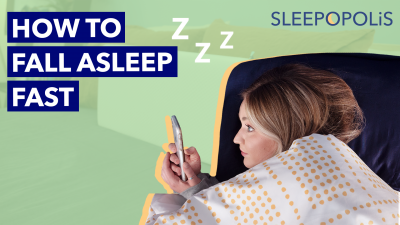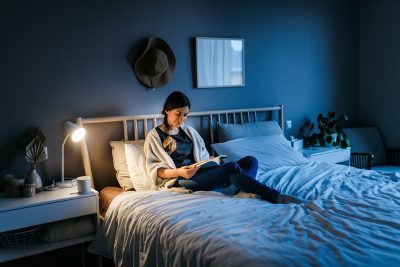Reasons You Can’t Sleep And What To Do About It.
- by Sharon Brandwein
- Updated: November 7, 2023
Table of Contents

While there are plenty of people out there who can fall asleep within 30 seconds of their head hitting the pillow, there are just as many who lay awake hour after excruciating hour as sleep eludes them. We’ll venture to guess that somewhere around hour three, these folks are hitting the internet to ask the almighty Google, “Why can’t I sleep?”
Unfortunately, the answer isn’t as straightforward as many of us would like. Whether it’s a result of stress, anxiety, too much cake for dessert, or even being under the weather, difficulty sleeping from time to time is to be expected (we are only human, after all). Prolonged bouts of sleepless nights, however, could be a sign of a more serious issue.
Note: The content on Sleepopolis is meant to be informative in nature, but it shouldn’t be taken as medical advice, and it shouldn’t take the place of medical advice and supervision from a trained professional. If you feel you may be suffering from any sleep disorder or medical condition, please see your healthcare provider immediately.
Long Story Short
- It’s normal to have a sleepless night from time to time.
- Sustained bouts of sleeplessness may be a sign of more serious health conditions.
- Lifestyle changes and improved sleep hygiene can help you get the sleep you need.
Stress and Anxiety
“Stress is one of the most common reasons for poor sleep and can lead to larger health issues such as anxiety and insomnia, says Dr. Chelsie Rohrscheib, sleep scientist at Wesper. (1) She goes on to tell Sleepopolis that stress in all its forms (acute and chronic) overstimulates our sympathetic nervous system (the part of our nervous system responsible for our fight or flight response). “The sympathetic nervous system then increases the amount of cortisol, the stress hormone in our bodies, which is extremely energizing and wake-promoting.”
And when we say “wake-promoting,” we mean it — according to Rohrscheib, “Excess blood cortisol has a similar effect to caffeine. It stimulates the brain to stay awake. (2)This makes stressed-out individuals very prone to insomnia because they may find it very difficult to wind down and relax at night. So not only does stress make it hard to fall asleep, but stressed-out people tend to wake up more frequently in the night and have difficulty falling back to sleep.”
Rohrscheib adds, “Anxiety and stress go hand in hand with how they affect sleep, and often one feeds into another. We almost never have anxiety without stress. Not only does anxiety have a similar effect on sleep as stress, but anxiety also tends to cause racing, intrusive thoughts while you’re trying to fall asleep, nightmares, and severe insomnia.”
An Undiagnosed Sleep Disorder
Insomnia
“Both stress and anxiety can cause insomnia, which is the most common sleep disorder,” says Rohrscheib. “Insomnia occurs when an individual cannot fall asleep within a reasonable amount of time, or they wake up before they are finished sleeping and are unable to fall back to sleep within a reasonable amount of time.”
And while losing some sleep from time to time is normal, Rohrscheib notes that if the failure to initiate or maintain sleep occurs at least three times per week, it’s then classified as insomnia. “If your insomnia lasts less than three months, it’s considered “acute” or short-term insomnia. Insomnia that lasts for more than three months is considered chronic insomnia,” she says. (3)
Sleep Apnea
Obstructive sleep apnea, the more prevalent type of sleep apnea, is a common sleep disorder that causes your breathing to stop and restart repeatedly throughout the night as a result of a collapsing airway. Apneas last anywhere from 10 to 20 seconds at a time, and in the most severe cases, they can happen hundreds of times per night. (4)
Dr. Audrey Wells, Founder of Super Sleep MD, tells us that sleep apnea keeps people up at night because the brain is “irritated with drops in blood oxygen level or even a reduction in breathing.” She adds, “The brain has to awaken from sleep to protect the person’s breathing. (5)These awakenings can range from subtle disruptions in sleep that a person may not remember the next day to full awakenings with difficulty returning to sleep.”
Obstructive Sleep Apnea vs. Central Sleep Apnea
Obstructive Sleep Apnea occurs as a result of an airway collapse while sleeping. Central Sleep Apnea occurs when the brain fails to send the proper signals to muscles that control breathing. Both conditions can lead to frequent and sudden awakenings, an inability to maintain sleep, and excessive daytime sleepiness. (6)
Restless Leg Syndrome
Wells tells us that restless leg syndrome is another sleep disorder that often keeps people awake at night. Also known as Willis-Ekbom disease, restless legs syndrome (RLS) is a rare sleep movement disorder that causes unpleasant tingling or uncomfortable sensations in your legs. (7) Relief from RLS symptoms often only comes with movement or stretching.
“People with RLS usually express more difficulty with sleep initiation at the beginning of the night,” says Wells. “However, the majority of people with restless leg syndrome also have a condition called periodic limb movement disorder, which is disruptive to sleep quality and can cause nighttime awakenings. (8)
This can cause problems because waking up in the middle of the night means you’ve already satisfied some of your “sleep drive,” and this makes the “hunger” for sleep less than it was at the beginning of the night.
Circadian Rhythm Disorders
Circadian rhythm disorders are also known as sleep-wake cycle disorders. (9)That description probably tells you everything you need to know about why you’re lying awake night after night, unable to sleep. Your body’s internal clock is out of sync with your environment or socially acceptable sleep schedules.
“Circadian rhythm disorders can cause difficulty with sleep initiation and maintenance,” says Wells. (9) “For example, delayed sleep phase syndrome is usually associated with insomnia at bedtime because the person is trying to go to bed on an earlier schedule that complies with their work or social obligations rather than their internal rhythm.”
These disorders often cause daytime fatigue because the people who have them have to follow schedules that don’t align with their body’s natural rhythm.
Room or Body Temperature
Your room and body temperature can have a profound impact on your ability to sleep. And we’ve all been there. In the absence of central air, the dog days of summer can be brutal, and very often, one of the first casualties is our sleep. Similarly, when the mercury plummets in mid-January, staying warm enough to drift off can also be challenging.
According to Rohrscheib, “It’s much harder for your brain to initiate sleep when your core body temperature is too high.” (10) So if you have any dreams of getting some shut-eye, you might consider dropping your thermostat to somewhere between 65 to 68 degrees Fahrenheit, though this may vary slightly from person to person. Hot sleepers could try cooling sheets and mattresses or an overhead fan, and cool sleepers might want to grab an extra blanket or two.
Screen Time or Blue Light Before Bed
While research shows that blue light can improve our mood, increase reaction times, and boost our attention and alertness, it also shows that blue light powerfully suppresses our melatonin production, shifting our shift circadian rhythms by as much as three hours. (11) (12)
While morning sun exposure (and the blue light we get from it) does a lot of good things for us, the screen time we love so much leaves us vulnerable to blue light. So, if you’re regularly checking out your socials before bed, pair blue light with a bit of anxiety, and you have your sneaky sleep stealers.
Alcohol Consumption
“While alcohol may certainly cause drowsiness, it actually disrupts sleep later during the night and can cause insomnia,” says Dr. Monique May, a Board-Certified Family Physician and Medical Advisory Board Member at Aeroflow Sleep. “Restorative sleep is interrupted as your body metabolizes (or breaks down) the alcohol. This negatively impacts REM and other phases of sleep, disrupting sleep architecture (or your pattern of movement through the different stages of sleep). So while you may find that that glass of wine after dinner helps you fall asleep faster, May says you may be in for frequent awakenings or poor sleep, both of which “can lead to fatigue the next day and contribute to the effect of hangovers.” (13)
Caffeine Intake
While most of us associate caffeine with coffee and energy drinks, the fact is caffeine is also found in tea, chocolate, and soda. “In addition to increasing mental alertness, caffeine may cause increased heart and breathing rates, muscle tremors, headache, irritability, jitteriness, insomnia, and increases in urinating and having bowel movements,” says May, who adds that all of the above can make it “difficult to sleep and diminish sleep quality.” (14) For these reasons, May suggests stopping your “caffeine intake at least 4-6 hours — ideally 8 hours — before your bedtime.”
Diet
“Diet affects sleep in a variety of ways,” says May. “First off, the timing of when one eats can impact sleep. Eating too close to bed — less than 2-3 hours before bedtime — can make sleeping difficult if your stomach is too full. (15) And, if you suffer from heartburn or acid reflux, eating and lying down can aggravate those conditions and prevent you from sleeping.”
And finally, May, like many others in the medical field, sounds the alarm on processed foods and sugar. “Processed, greasy, spicy, fatty, and sugary foods can disrupt sleep by their effects on the body. Stomach upset, sugar fluctuations, feelings of hunger (due to sugar levels crashing after initially spiking), or food cravings can occur.”
Ultimately, May suggests steering clear of the worst offenders:
Foods that relax the lower esophageal sphincter (the ring of muscle at the bottom of the food tube that leads into the stomach)
- Mint
- Caffeine
- Tomato-based foods
- Onions
- Garlic
- Chocolate
- Fatty foods
- Alcohol
- Citrus fruits
- Dairy (especially if you’re lactose intolerant, which can lead to bloating, cramping, and diarrhea)
An Inactive or Sedentary Lifestyle
“In order to have good sleep quality, there needs to be a contrast between nighttime and daytime,” says Wells. “Some people with insomnia or nighttime awakenings can see improvements in their sleep reliability by increasing their physical activity during the day in contrast to lying still at night. Similarly, mental activity during the day increases the craving for rest at night and can be very sleep-promoting.”
Illness or Sickness
If you’re battling a cold or the flu, you’ll probably find that you can’t sleep, no matter how hard you try. And there’s no mystery here; a stuffy nose, coughing, chest congestion, and pain can be incredibly uncomfortable, so sleep likely won’t come easy until you’re on the mend.
Tips for What To Do When You Can’t Fall Asleep
A sleepless night here and there shouldn’t be much cause for concern. If you can’t sleep for prolonged periods, however, Rohrscheib says it’s important to determine the cause and address the issue. If you think your inability to sleep may be the result of a sleep disorder or mental health issue, it’s probably best to speak with your doctor. Otherwise, Rohrscheib suggests lifestyle changes and some fine-tuning to your sleep hygiene.
Practicing Good Sleep Hygiene
“Sleep hygiene is the habits and behaviors that positively affect your sleep,” says Rohrscheib. This includes avoiding late caffeine consumption, avoiding electronics in the hour leading to bedtime, and maintaining a bedroom environment that’s dark, cool, quiet, and comfortable.
Keep a Strict Sleep Schedule
We know it can be hard, but sticking to a regular routine really can make all the difference. Rohrscheib says that consistent sleep and wake schedules “keep your internal biological clock well-regulated and help your brain know when to make you feel tired and ready for sleep.”
Try a Relaxing Bedtime Routine
If sleepless nights are becoming the rule, not the exception, Rohrscheib suggests “using the hour before sleep to focus on calm, relaxing activities such as reading, meditating, or deep breathing. This will help reduce stress and anxiety and move your nervous system from the sympathetic side to the parasympathetic side, which is necessary for sleep.”
The Parasympathetic Nervous System, Explained
While your sympathetic nervous system maintains vigilance to keep you safe, activating your fight or flight response when necessary. The parasympathetic nervous system maintains vigilance over your rest and sleep. Its job is to relax your body and put the brakes on unnecessary activities so you can get the rest you need. Among other things, your parasympathetic nervous system constricts your pupils to limit the amount of light that enters your eyes, lowers your heart rate, and diverts your body’s energy to help you digest food. (16)
Take a Deep Breath
If stress and anxiety are getting in the way of your sleep, finding a way to calm down is one of the best ways to fast-track toward some shuteye. Rohrscheib suggests doing “visualizations or deep breathing to lower your heart rate and blood pressure and to get your mind off racing thoughts.” Some popular breathing exercises for relaxation include box breathing and the 4-7-8 technique.
Get Out of Bed
And while it may sound counterintuitive, Rohrscheib says, “If you can’t fall asleep within 20-30 minutes, get out of bed and go somewhere dark, quiet, and calm. Do a relaxing activity to help take your mind off of not being able to sleep. After about 20-30 minutes, get back into bed and try to fall asleep again.”
When to Call Your Doctor or Provider
The inability to sleep for prolonged periods can be caused by any number of health conditions, chronic pain, sleep disorders, or mental health disorders. If you suspect any of the above, you should probably speak with your doctor. If stress or anxiety prevents you from sleeping at night, you might consider seeking help from a mental health professional.
FAQS
Should I just stay awake if I can’t sleep?
While it may be tempting to make the most of time when you can’t sleep, research shows that resting with your eyes closed can benefit learning and memory. While sleep is preferred, waking rest is a close second. So, when you can’t sleep, don’t get up and reorganize your closets; keep the lights dim and try to rest. (17)
Why can’t I sleep after working out?
Along with a host of good chemicals released into your bloodstream, exercise also releases the stress hormone cortisol, which can be wake-promoting. So, while getting plenty of exercise is good for your health and sleep, engaging in strenuous exercise before bed can be counterproductive to getting some shut-eye.
Why can’t I sleep without a blanket?
While blankets mainly help us regulate our body temperature while we sleep, there is some evidence to suggest that blankets improve our sleep by lowering blood pressure, heart rate, and cortisol levels.
The Last Word From Sleepopolis
It’s never easy to lay awake wondering why you can’t sleep. If it happens night after night, you might consider checking in with your doctor to rule out something more serious. If you have an otherwise clean bill of health, it might be worth digging into your sleep hygiene and making some changes.
Sources
- American Psychological Association. (n.d.). Stress and sleep. American Psychological Association. https://www.apa.org/news/press/releases/stress/2013/sleep.
- Physiology, cortisol – statpearls – NCBI bookshelf. (n.d.-g). https://www.ncbi.nlm.nih.gov/books/NBK538239/
- Chronic insomnia – statpearls – NCBI bookshelf. (n.d.-b). https://www.ncbi.nlm.nih.gov/books/NBK526136/
- Jorge Rey de Castro a b, a, b, c, d, e, & AbstractPurpose The severity of obstructive sleep apnoea (OSA) ranges from mild or moderate to severe sleep apnoea. (2015, April 4). Clinical factors associated with extreme sleep apnoea [AHI>100 events per hour] in Peruvian patients: A case-control study–a preliminary report. Sleep Science. https://www.sciencedirect.com/science/article/pii/S1984006315000139
- Osman AM, Carter SG, Carberry JC, Eckert DJ. Obstructive sleep apnea: current perspectives. Nat Sci Sleep. 2018;10:21-34. Published 2018 Jan 23. doi:10.2147/NSS.S124657
- Muza RT. Central sleep apnoea-a clinical review. J Thorac Dis. 2015;7(5):930-937. doi:10.3978/j.issn.2072-1439.2015.04.45
- Restless legs syndrome: Over 50 years of … – Wiley Online Library. (n.d.-f). https://onlinelibrary.wiley.com/doi/full/10.1111/jsr.13632
- U.S. National Library of Medicine. (n.d.-b). Restless legs | RLS. MedlinePlus. https://medlineplus.gov/restlesslegs.html
- Circadian rhythm sleep disorders – american academy of sleep medicine. (n.d.-c). https://aasm.org/resources/factsheets/crsd.pdf
- Harding EC, Franks NP, Wisden W. The Temperature Dependence of Sleep. Front Neurosci. 2019;13:336. Published 2019 Apr 24. doi:10.3389/fnins.2019.00336
- Blue light exposure reduces objective measures of sleepiness during … (n.d.-a). https://www.researchgate.net/publication/26700047_BLUE_LIGHT_Exposure_Reduces_Objective_Measures_of_Sleepiness_during_Prolonged_Nighttime_Performance_Testing
- Blue Light has a dark side. Harvard Health. (2020, July 7). https://www.health.harvard.edu/staying-healthy/blue-light-has-a-dark-side
- He S, Hasler BP, Chakravorty S. Alcohol and sleep-related problems. Curr Opin Psychol. 2019;30:117-122. doi:10.1016/j.copsyc.2019.03.007
- Weibel, J., Lin, YS., Landolt, HP. et al. The impact of daily caffeine intake on nighttime sleep in young adult men. Sci Rep 11, 4668 (2021). https://doi.org/10.1038/s41598-021-84088-x
- Chung N, Bin YS, Cistulli PA, Chow CM. Does the Proximity of Meals to Bedtime Influence the Sleep of Young Adults? A Cross-Sectional Survey of University Students. Int J Environ Res Public Health. 2020;17(8):2677. Published 2020 Apr 14. doi:10.3390/ijerph17082677
- Encyclopædia Britannica, inc. (2023, June 17). Parasympathetic nervous system. Encyclopædia Britannica. https://www.britannica.com/science/parasympathetic-nervous-system
- Humiston GB, Wamsley EJ. A brief period of eyes-closed rest enhances motor skill consolidation. Neurobiol Learn Mem. 2018;155:1-6. doi:10.1016/j.nlm.2018.06.002
- Dr. Chelsie Rohrscheib. Email Communication. July 13, 2024.
- Dr. Audrey Wells. Email Communication. July 15, 2024.
- Dr. Monique May. Email Communication. July 14, 2024.
Subscribe Today!
Get the latest deals, discounts, reviews, and giveaways!



